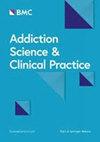Improving the quality of counseling and clinical supervision in opioid treatment programs: how can technology help?
IF 3.7
2区 医学
Q1 SUBSTANCE ABUSE
引用次数: 0
Abstract
The opioid epidemic has resulted in expanded substance use treatment services and strained the clinical workforce serving people with opioid use disorder. Focusing on evidence-based counseling practices like motivational interviewing may be of interest to counselors and their supervisors, but time-intensive adherence tasks like recording and feedback are aspirational in busy community-based opioid treatment programs. The need to improve and systematize clinical training and supervision might be addressed by the growing field of machine learning and natural language-based technology, which can promote counseling skill via self- and supervisor-monitoring of counseling session recordings. Counselors in an opioid treatment program were provided with an opportunity to use an artificial intelligence based, HIPAA compliant recording and supervision platform (Lyssn.io) to record counseling sessions. We then conducted four focus groups—two with counselors and two with supervisors—to understand the integration of technology with practice and supervision. Questions centered on the acceptability of the clinical supervision software and its potential in an OTP setting; we conducted a thematic coding of the responses. The clinical supervision software was experienced by counselors and clinical supervisors as beneficial to counselor training, professional development, and clinical supervision. Focus group participants reported that the clinical supervision software could help counselors learn and improve motivational interviewing skills. Counselors said that using the technology highlights the value of counseling encounters (versus paperwork). Clinical supervisors noted that the clinical supervision software could help meet national clinical supervision guidelines and local requirements. Counselors and clinical supervisors alike talked about some of the potential challenges of requiring session recording. Implementing evidence-based counseling practices can help the population served in OTPs; another benefit of focusing on clinical skills is to emphasize and hold up counselors’ roles as worthy. Machine learning technology can have a positive impact on clinical practices among counselors and clinical supervisors in opioid treatment programs, settings whose clinical workforce continues to be challenged by the opioid epidemic. Using technology to focus on clinical skill building may enhance counselors’ and clinical supervisors’ overall experiences in their places of work.提高阿片类药物治疗项目的咨询和临床监督质量:技术如何提供帮助?
阿片类药物的流行扩大了药物使用治疗服务的范围,也使为阿片类药物使用障碍患者服务的临床人员队伍更加紧张。咨询师及其督导人员可能会对动机访谈等循证咨询实践感兴趣,但对于繁忙的社区阿片类药物治疗项目来说,记录和反馈等时间密集型坚持治疗任务则是奢望。改进临床培训和督导并使之系统化的需求可以通过不断发展的机器学习和基于自然语言的技术领域来解决,这些技术可以通过自我和督导人员对咨询过程录音的监控来提高咨询技能。我们为阿片类药物治疗项目中的咨询师提供了一个机会,让他们使用基于人工智能、符合 HIPAA 标准的记录和监督平台(Lyssn.io)来记录咨询过程。随后,我们进行了四次焦点小组讨论--两次是咨询师,两次是督导,以了解技术与实践和督导的整合情况。问题集中在临床督导软件的可接受性及其在 OTP 环境中的潜力;我们对回答进行了主题编码。心理咨询师和临床督导员都认为临床督导软件有利于心理咨询师的培训、专业发展和临床督导。焦点小组参与者表示,临床督导软件可以帮助心理咨询师学习和提高动机访谈技能。心理咨询师表示,使用该技术可以突出心理咨询接触(相对于文书工作)的价值。临床督导指出,临床督导软件有助于满足国家临床督导指南和地方要求。心理咨询师和临床督导都谈到了要求会话记录的一些潜在挑战。实施循证心理咨询实践可以帮助开放式培训中心的服务对象;关注临床技能的另一个好处是强调并提升心理咨询师的价值。机器学习技术可以对阿片类药物治疗项目中心理咨询师和临床督导人员的临床实践产生积极影响,因为阿片类药物的流行使这些机构的临床工作人员继续面临挑战。利用技术专注于临床技能的培养,可以提升心理咨询师和临床督导在工作场所的整体体验。
本文章由计算机程序翻译,如有差异,请以英文原文为准。
求助全文
约1分钟内获得全文
求助全文
来源期刊

Addiction Science & Clinical Practice
Psychology-Clinical Psychology
CiteScore
3.90
自引率
10.80%
发文量
64
审稿时长
28 weeks
期刊介绍:
Addiction Science & Clinical Practice provides a forum for clinically relevant research and perspectives that contribute to improving the quality of care for people with unhealthy alcohol, tobacco, or other drug use and addictive behaviours across a spectrum of clinical settings.
Addiction Science & Clinical Practice accepts articles of clinical relevance related to the prevention and treatment of unhealthy alcohol, tobacco, and other drug use across the spectrum of clinical settings. Topics of interest address issues related to the following: the spectrum of unhealthy use of alcohol, tobacco, and other drugs among the range of affected persons (e.g., not limited by age, race/ethnicity, gender, or sexual orientation); the array of clinical prevention and treatment practices (from health messages, to identification and early intervention, to more extensive interventions including counseling and pharmacotherapy and other management strategies); and identification and management of medical, psychiatric, social, and other health consequences of substance use.
Addiction Science & Clinical Practice is particularly interested in articles that address how to improve the quality of care for people with unhealthy substance use and related conditions as described in the (US) Institute of Medicine report, Improving the Quality of Healthcare for Mental Health and Substance Use Conditions (Washington, DC: National Academies Press, 2006). Such articles address the quality of care and of health services. Although the journal also welcomes submissions that address these conditions in addiction speciality-treatment settings, the journal is particularly interested in including articles that address unhealthy use outside these settings, including experience with novel models of care and outcomes, and outcomes of research-practice collaborations.
Although Addiction Science & Clinical Practice is generally not an outlet for basic science research, we will accept basic science research manuscripts that have clearly described potential clinical relevance and are accessible to audiences outside a narrow laboratory research field.
 求助内容:
求助内容: 应助结果提醒方式:
应助结果提醒方式:


